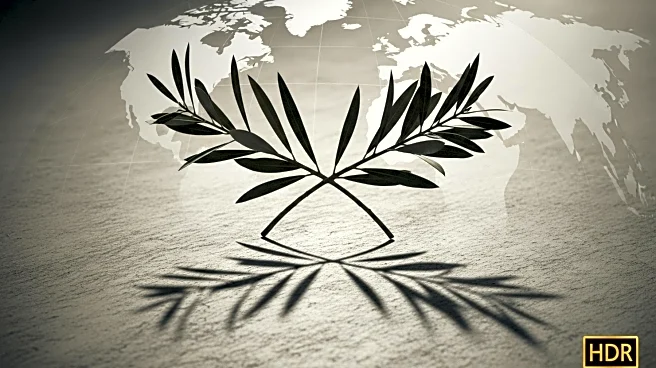What is the story about?
What's Happening?
Pakistan's Foreign Office has described recent actions in Kabul as legitimate self-defence against militants operating from Afghan territory. The statement follows reports of twin explosions in Kabul, which Afghan media attributed to precision air strikes targeting a compound linked to the Tehreek-i-Taliban Pakistan (TTP). The Foreign Office spokesperson emphasized Pakistan's commitment to the security of its people and stated that operations are intelligence-driven, targeting terrorist groups like the TTP. Conflicting reports have emerged regarding the fate of TTP chief Noor Wali Mehsud, with some claiming the strike was a significant blow to the TTP, while TTP-linked channels released an audio message purportedly from Mehsud denying his death. Afghan authorities condemned the alleged attack, accusing Pakistan of violating Afghan airspace and bombing civilian areas.
Why It's Important?
The incident marks a potential escalation in tensions between Pakistan and Afghanistan, particularly since the Taliban's return to power in 2021. Pakistan has consistently accused militants based in Afghanistan of launching cross-border attacks, which has strained relations between the two countries. The strikes, if confirmed, could signify a shift in Pakistan's approach to dealing with threats from across the border, potentially impacting regional stability. The situation also highlights the ongoing challenges in addressing terrorism in the region, with both countries needing to navigate complex diplomatic and security dynamics. The broader implications could affect international relations, especially with other countries like India engaging with Afghanistan.
What's Next?
The situation may lead to increased diplomatic efforts to address the tensions between Pakistan and Afghanistan. Pakistan's military spokesperson has underscored the country's right to defend itself, indicating a possible continuation of such operations if deemed necessary. Afghan authorities may seek international support to address the alleged violations of their airspace. Additionally, the recent agreement between India and Afghanistan to reopen embassies could influence regional dynamics, as Pakistan has urged that Afghan soil should not be used against it. The developments may prompt further dialogue and cooperation efforts to mitigate the risk of escalation.
Beyond the Headlines
The strikes and subsequent diplomatic exchanges could have long-term implications for regional security and cooperation. The situation raises ethical questions about sovereignty and the use of force in international relations. It also underscores the importance of intelligence and precision in military operations, as well as the need for transparent communication between nations to prevent misunderstandings. The evolving geopolitical landscape in South Asia may require new strategies to address terrorism and foster stability.















